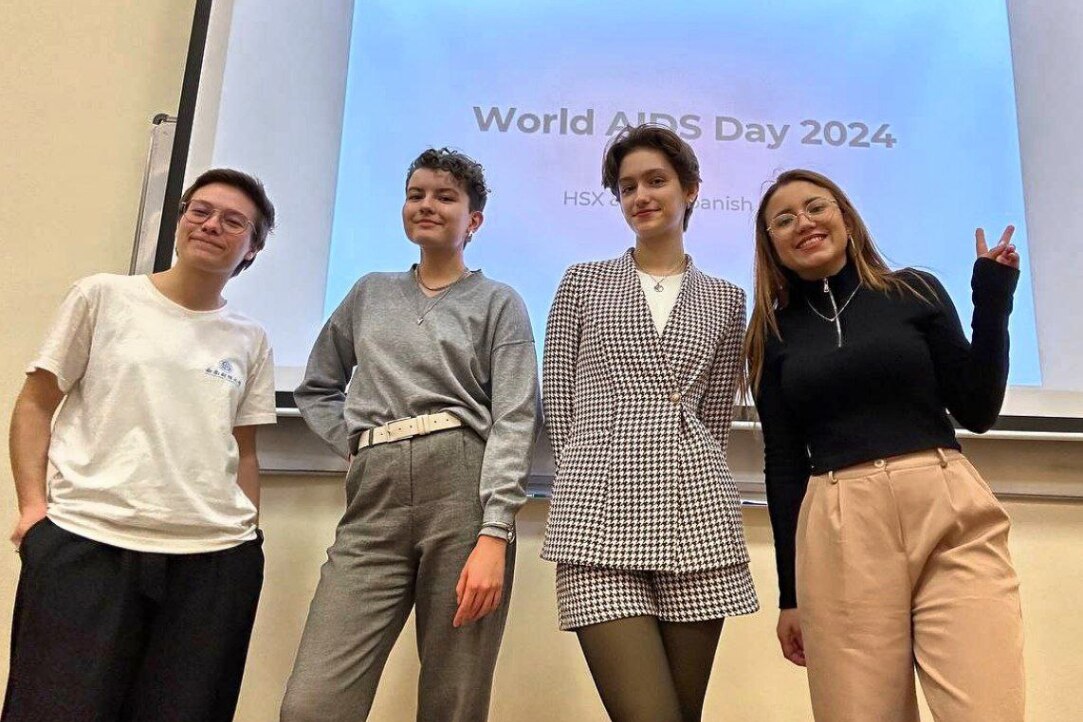‘This Event is About Awareness, Health, and Knowledge Sharing’

In support of World AIDS Day 2024, the HSE Spanish Club and the HSX Student Club organised a lecture in English dedicated to the fight against the disease in Russia and Spain.
Alina Ilyukhina, event producer for the HSE Spanish Club and 2024 graduate of the master's programme ‘Digital Humanities’
‘On December 2, in honour of World AIDS Day, the Spanish Club and HSX joined forces to raise awareness about HIV among international and Russian students at HSE University. Our lecture covered not only general information about HIV and AIDS but also myths and stereotypes associated with the disease, locations for free testing, and a comparison of approaches in Russia and Spain.
We shared the latest statistics from Russia and Spain and discussed social programmes provided by their governments. This event was about openness, breaking stigmas, raising awareness, taking care of one’s health, and sharing knowledge from different countries. All the materials were prepared independently, based on publicly available data from WHO and the health ministries of Russia and Spain.’
Katherin Carolina Vivas Terán of Bolivia, a master’s student of the programme ‘Strategic Corporate Finance’ at the Faculty of Economic Sciences, made a report on the state of the HIV/AIDS epidemic in Spain, drawing on data from the Spanish Ministry of Health and UNAIDS. She highlighted that in October 2024, the Spanish government announced a €1 million contribution to UNAIDS to support its work to end AIDS by 2030 as part of the Sustainable Development Goals.
Evgenia Sunsina, Head of HSX and 2023 graduate of HSE’s bachelor’s programme ‘Advertising and Public Relations’
‘HSX is a student organisation focused on improving sexual literacy among adult students. For us, December 1 is an additional reason to address the critical topic of HIV and AIDS. Each year, we release posts dedicated to World AIDS Day, and for the past two years, we have held lectures in collaboration with the Spanish Club.
In all our materials, we strive to cover both general aspects of the diseases (the difference between HIV and AIDS, modes of transmission, how the virus is not transmitted, and so on) as well as lesser-known information. For instance: What should you do if there is a risk of infection? Can an HIV-positive person conceive a child naturally without infecting their partner? Can an HIV-positive woman give birth to a healthy child? We always rely on verified sources, such as UNAIDS, WHO, and AIDS.Centre (Russia).
Many students find these topics uninteresting, thinking they are boring, obvious, or irrelevant. However, the level of awareness is still far from ideal, and HIV impacts many areas of social life.’
The event was attended by students from Spain, Bolivia, El Salvador, and Colombia.
See also:
Fear and Uncertainty Lead to AIDS Denialism
December 1 marked World AIDS Day, the purpose of which is to increase global awareness of the disease. Researchers from HSE’s campus in St. Petersburg have spent the last two years studying a movement of individuals called ‘AIDS dissidents,’ or people who deny the existence of AIDS. Peter Meylakhs, Senior Research Fellow with the International Centre for Health Economics, Management, and Policy at HSE St. Petersburg, discusses some of his research results below.


